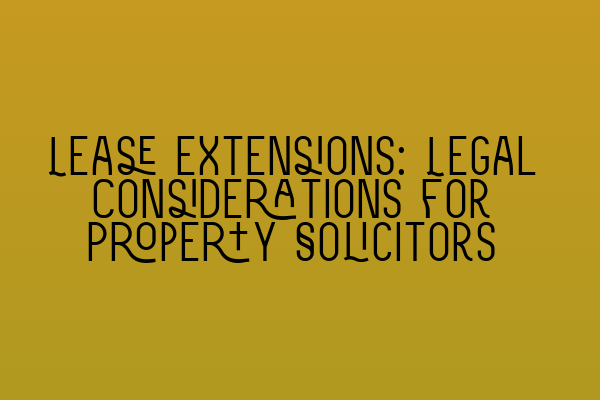Lease Extensions: Legal Considerations for Property Solicitors
As a property solicitor, you understand the complexities and nuances of lease extensions. Helping clients navigate through the intricacies of lease extensions requires a deep understanding of property law and a keen eye for detail. In this blog post, we will explore some of the key legal considerations that property solicitors need to be aware of when dealing with lease extensions.
First and foremost, it is important to understand the basics of a lease extension. A lease extension allows a leaseholder to extend the length of their lease beyond the original term. This can have significant financial implications for both the leaseholder and the freeholder. Therefore, it is crucial to thoroughly review the existing lease agreement and assess the potential impact of extending the lease.
One key consideration in lease extensions is the eligibility criteria. In England and Wales, the Leasehold Reform, Housing, and Urban Development Act 1993 provides certain rights for leaseholders to extend their leases. One of the key eligibility requirements is that the leaseholder must have owned the lease for at least two years. As a property solicitor, you will need to verify the client’s eligibility and advise them on their rights under the Act.
Another important consideration is the valuation of the lease extension. The value of a lease extension is determined by various factors such as the length of the extended lease, the remaining term of the existing lease, and the property’s market value. It is essential to have a thorough understanding of property valuation principles to accurately assess the value of the lease extension. Collaborating with a qualified valuer can greatly assist in this process.
When advising clients on lease extensions, it is also important to consider the statutory requirements and timelines. The Act sets out specific timelines for each stage of the lease extension process, including serving the initial notice, negotiating the terms, and completing the transaction. As a property solicitor, you must ensure that all necessary statutory requirements are met within the prescribed timelines to avoid any potential pitfalls or delays.
In addition to the legal aspects, it is important to consider the tax implications of lease extensions. Lease extensions can trigger tax liabilities, such as Stamp Duty Land Tax (SDLT). It is crucial to advise clients on the potential tax implications and help them understand their obligations in this regard. Collaborating with a tax specialist can be beneficial to ensure compliance with tax laws and minimize any potential liabilities.
Furthermore, when dealing with lease extensions, it is crucial to fully understand the client’s objectives and assist them in achieving their desired outcome. It is important to explore alternative options, such as negotiating the terms of the lease extension, entering into a new lease, or considering enfranchisement. By considering all possible avenues, you can provide comprehensive advice tailored to your client’s specific needs and circumstances.
As a property solicitor, it is essential to stay updated with the latest developments in property law and leasehold reform. The Solicitors Qualifying Exam (SQE) is a rigorous assessment that ensures solicitors have the necessary knowledge and skills to provide competent legal advice. If you are preparing for the SQE, be sure to check out our related articles on SQE 1 Practice Exam Questions and SQE 1 Practice Mocks FLK1 FLK2. These resources will help you test your knowledge and hone your skills in property law.
At SQE Property Law & Land Law, we offer comprehensive preparation courses for both the SQE 1 and SQE 2 exams. Our expert tutors will guide you through the intricacies of property law and provide you with the knowledge and skills necessary to excel in your legal career. Check out our SQE 2 Preparation Courses and SQE 1 Preparation Courses to kickstart your journey towards becoming a qualified solicitor.
In conclusion, lease extensions present unique legal considerations for property solicitors. From assessing eligibility and valuing the extension to navigating statutory requirements and tax implications, there are several factors to consider. By staying informed, collaborating with experts, and providing tailored advice, you can help your clients secure a successful lease extension. For more information on SRA SQE exam dates, don’t forget to check out our article on SRA SQE Exam Dates.
